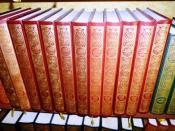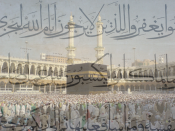Lessons from Hizb Al-Tahrir Week 1 Before the Circle Proof of God Man has various types of thought that allow him to come to certain conclusions. For example we have logical thought (of which empirical thought is one type) so we can deduce laws and axioms by observing things. For example by heating a 100 objects we can deduce that when you heat objects they expand, this is the basis of the scientific process, but here lies the catch because your laws can only work until something comes to defeat it for example when one heats ice it expands and so this makes the law void. For example the square root of 4 is 2 but what is the square root of minus 4? 2i this is an imaginary number and we cannot relate this to reality even though this is found my mathematical reasoning, also the concept of infinity is apt to be discussed here.
What is infinity? It could be described, as be unlimited/limitless. The final type of thought that we can discuss s rational thought, a type of thought that has bearing upon reality. This type of thought is excellent in trying to prove anything as it has the advantage of the other types of thought of being able to be experienced by others also it has the benefit over emotions as it is not confined to being experienced by the individual but can be experienced by others. For example a Christian (or any other religion) can say that they had an 'experience' by which they 'found' god by having the holy spirit talk with them, but if we rely upon this then other people can say well I had an experience with Rama or I reached Nirvana etc, so this is discarded and disregarded. So using rational thought we shall attempt to prove that god exists. So using the reality around us we see that there are objects of defined characteristics e.g. an ant, it has a certain size and shape it has antennae, it can lifts things etc. The ant however is limited i.e. it is of a set size and set weight and set colour(s) it cannot exceed these constraints, i.e. you do not find ants which are in excess of 1 metres in diameter. Now expanding this concept to encompass the entire universe we see that the entire universe and everything that is contains is limited and dependent, so we have the earth and the solar system which is limited by the mass it has because of the finite amount of matter it contains, secondly it is dependent upon the sun to hold the planets in orbit, the sun itself is finite and has to rely upon the hydrogen and helium atoms within it to sustain its nuclear fusion to produce energy for the earth. Now the entire universe itself is a slave to the laws of physics, but who put those laws there? If that entity is limited and dependent who put that entity there also and ad infinatumâ¦so there must come a point where the chain stops and we arrive at a point where there is an entity which is not limited and not dependent and we call this entity Allah. Why must the chain stop? Because as we have said that this would mean that the universe has a infinite character to it and infinity has the curious aspect to it that all its attributes are infinite so by virtue of there being limited objects that make it up it cannot be infinite (also Prof. Steven Hawking has said in his seminal work "A Brief History of Time" that if the universe were to be infinite then at every point in the sky there would at some distance be a star and so the night sky should be bright as day, again this does not agree with reality) therefore to break the chain of infinity the creator is invoked. Also this creator cannot be part of the universe but must be outside of it otherwise it would again violate the laws of infinity but the source of all dependence is traced back to Allah.
From the Circle Man does not posses the right or the tools to legislate for himself Man cannot legislate by using his own intellectual powers (Al-Aql). For example if we got a room full of people and asked them to decide the fate of a given situation for example, if a problems arises in childbirth leading to a decision where either the child is saved or the women, varying opinions will be put forward in order so that the women is saved or the child for example it could be said that the women is more better to be saved because she can have other children but the husband may want to save the child because he can marry again. So the only manner we can legislate for mankind is by what Allah has given us in the form of Islam (Quran and Sunnah). No matter how much we try we cannot legislate for ourselves Allah has given us Aql but this can only be used to derive and deduce laws from what Allah and Rasoolullah (pbuh&hf&hc) has given to us. This neatly leads us to the axiom that for every action/inaction in Islam we need evidence.
Week 2 Before the Circle Proof of Quran What makes us believe the Quran is Al-Kalamallah (The word of God)? Is it not possible that Muhammad (pbuh&hf&hc) wrote it? Or that another Arab wrote it? Using this we find there are five distinct possibilities.
1. Muhammad (pbuh&hf&hc) wrote it.
2. Another Arab wrote it.
3. A non-Arab wrote it.
4. Aliens wrote it.
5. Allah It should be stated that the Quran itself is a masterpiece of Arabic literature; its style, grammar and meaning are unique. When one tries to imitate the style one can't get the grammar or the meaning right and if one tries to imitate the grammar the meaning and style remain elusive and if ones tries to get the meaning correct one loses the grammar and the style. As is stated in the Quran, its challenge to the disbelievers produced one chapter (Surah) like it if it is indeed possible. This challenge has not been met for over fourteen hundred years.
Did Muhammad (pbuh&hf&hc) write it? Well what we find is that the speech of Muhammad (pbuh&hf&hc) and that of the Quran is different, as recorded in the Ahadith, in the sense that as Muhammad (pbuh&hf&hc) grew older he increased his vocabulary and as he became a statesmen his orders changed etc, so we see there is a process of evolution to his speech as with any work or person the manner in which the speak/write etc is bound to change over time. Muhammad (pbuh&hf&hc) could not read or write therefore for him to produce such a work was very difficult near impossible unless he hid his ability to read and write, which would not have earned him his title of Al-Amin (the trustworthy). This is not so with the Quran, it has the same style, grammar and meaning even though it was revealed over a period of forty years. Therefore it could not be him. Was it another Arab? Well Muhammad (pbuh&hf&hc) was an Arab and he could not do it so no other Arab could do it no matter how literate he was because as stated before the style, grammar and meaning are unique and irreproducible. Therefore it could not have been another Arab. If it was not another Arab then this discounts the next contender straight away, a non-Arab, because who knows more about a language then its own people? Now we have to face difficult one - Aliens. Could it have been beings from another planet came and gave Muhammad (pbuh&hf&hc) the Quran? Well what we see is that the implicit reasoning behind this is that they were more advanced then the people of Muhammad's (pbuh&hf&hc) time and so they could have written the book, but as we (mankind) have progressed with it we have also acquired more information about the Arabic language and yet still the Quran can not be imitated. The more information you have about something the better you can judge or make a conclusion about it for example, a cup has certain characteristics that make it a cup but the information you get the more elaborate and more better your judgement would be but the basic concept of the cup still remains (the principle of principality whereby you take simple concepts and build with them to make a derivative and more complex concept, e.g. 'a mountain' and 'gold' two simple concepts put them together and you get 'a mountain of gold'). So the aliens may acquire the information in a different way (i.e. telepathy as opposed to verbal communications) but the information is still the same, so the knowledge of Arabic they had and the people of Muhammad's (pbuh&hf&hc) time had is still the same but they could not produce a similar work as the Quran so by virtue of this Aliens could not have produced this either. So the conclusion we draw is the Allah is the being who is the author of the Quran.
From the Circle Definition of Islam To define something we can make sure that there is no confusion about what the object is for example if I was to say that John is a man, the definitions not comprehensive enough about if we say that John is 6 foot 5 and he has a scar on his left cheek is white etc then a more comprehensive judgement can be made. So we must make a comprehensive definition that is also restrictive.
Islam is the Deen revealed to Muhammad (pbuh&hf&hc) that regulates man's affairs with his creator, himself and with other men.
This definition is comprehensive and is restrictive at the same time so that we can say was what was revealed to Musa (pbuh) Islam? No, even though it was from Allah it does not fit he definition in the first sense e.g. it was revealed to Muhammad (pbuh&hf&hc)! Week 3 From the Circle Aqeedah and Ideologies Aqeedah is a set of fundamental beliefs from which systems of life emanate in the form of an ideology. Aqeedah must answer three fundamental questions that everyone asks once in their life.
1. Where did I come from? 2. What am I doing here? 3. Where am I going? So this means that everyone has an Aqeedah, for example a Christian has an Aqeedah in which he answers the three questions as follows, God created me, live a good life and repent and except Jesus Christ as the Messiah and son of God and by his permission you shall enter heaven and the answer to the final question is either heaven or hell depending upon whether you repented or not and accepted Jesus in your life. Surprisingly people who are Atheists, Communist, Democrats and other social groupings have Aqeedah as well. Referring to the definition of Islam we see that the key aspect that turns it from a simple religion that fulfils man relationship with his creator is the aspect of the relationship between men and other men i.e. man's relationship with society, now other religions do not have this aspect, i.e. if you publicly came and said that you did not believe in Jesus being the son of God what s the punishment in Christianity? There is none but if you publicly were to say that praying five times a day is not necessary in the context of an Islamic state then the state gives you three days to repent after which you will be executed if you do not repent. So we see because of this Islam is an ideology, like communism and like capitalism, so as communism and capitalism are systems of Kufr Islam is the diametric opposite and as a opposite it must fight them, because they do not answer the three questions properly (Where did I come from? What am I doing here? Where am I going?). The communist will say that we come from the matter around us and we are here to enhance human society and we shall return to the matter from whence we came. The capitalist will say similar things. Other religion fit easily into these ideologies as they do not conflict with them, and ideology is a system of rational systems of life, which emanate from the central Aqeedah.
Week 4 From the Circle Politics Since we have defined what Islam is and the other topics from the other various circles we come to the conclusion that we are also responsible for the people of Islam no matter how far and wide they may be scatter across the face of this planet, because the problems in Kashmir or Palestine or Chechnya or Bosnia or Muslim problems which can only be solved by Muslims. This is because we must interact with society and so we see that managing the affairs of people is the responsibility of all Muslims not to just a select few, the prophet (pbuh&hf&hc) said, "When someone sees and injustice committed he should correct it with his hands if not then by his tongue if not then his heart and this is the lowest form of faith", so this clearly shows that we must correct the people when Islam is not implemented properly. This statement "Managing the affairs of the people" inevitably leads to the term politician because that is the function of a politician and so invariably we come to the conclusion that every Muslim has to be a politician.
Thought We have discussed Al-Aql (the intellect) in the first circle but what is intellect or thoughts? Why do we think what is the real reason. We find the only reason people think is to solve some problem that we are facing either a desire that needs to be fulfilled or some instinct. So when a man is hungry, he begins to think because he has to fulfil a organic need, he has to find food (how does he know what food to eat?) and he has to acquire it, etcâ¦from this we can conclude that there are four elements needed to think; 1. Previous Information 2. Senses 3. Reality 4. Mind We need previous information because without the previous information, taking the example above, how would someone know what food is? We need senses to acquire the information because the man would not be otherwise able to smell the food or see it so he can connect it to the previous information and derive that this is food. He needs a reality otherwise his senses are useless and he cannot get any information. Last he needs a mind because he needs someway of organising the information to produce a thought.





